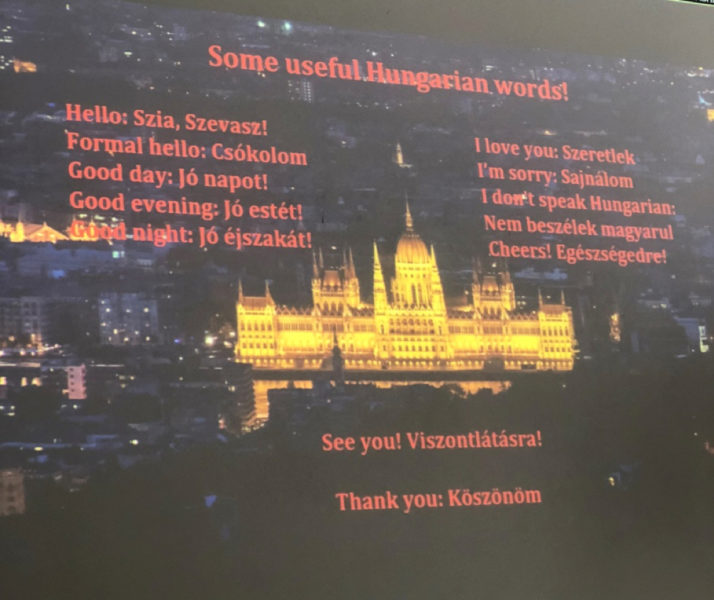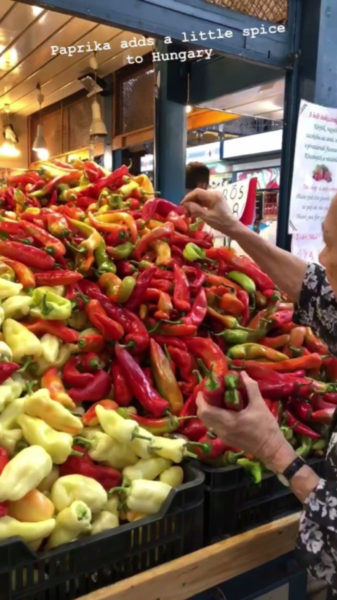Budapest is an amazing city, but even after being here for only a few days, you are sure to find some immediate cultural differences from the United States.
Here’s what I’ve learned about life in Budapest so far:
The Language
The obvious difference between Hungary and the United States would be the language. But have no fear! Upon our arrival to Budapest, we were assured that for the semester we’ll be here it’s important — and realistic — to learn the basics of Hungarian (otherwise referred to as “survival” Hungarian). It would potentially take years and years to become even just sufficient in this language, as its dialect is closest to that of the Finnish language. My basic Spanish skills won’t be of any help here.

So far, I’ve learned about five Hungarian words and phrases: yes, no, thank you, good day, and excuse me. These are a good baseline for communicating with locals to show them you’re making an effort to appreciate their language.
Navigating a new city when every street is named something like “Bajcsy-Zsilinszky ut” or “Vörösmarty tér” can make culture shock set in pretty quickly. But luckily, in the city center and more touristy areas, English is pretty commonly spoken.
The People
So far, all my interactions with Hungarians have been extremely positive. I was ordering coffee the other day and the young, Hungarian barista asked if I was attending university in Budapest. I explained that I was indeed studying here and apologized that my use of the Hungarian language was not very advanced. I tend to feel guilty automatically speaking English in a country where it isn’t the native language. She just smiled super big and reassured me that it was totally okay… so friendly!
Of course, the younger generations in a city can tend to be more progressive and friendlier than some of the older generations. After years of communism, the older generations of Hungary can come across as a little standoffish and cold. However, based on my experiences so far, I’ve found they are always willing to help as best they can (regardless of the language barrier) if you need directions or help sorting things like currency differences out.
In my experience so far, locals of all ages have been extremely reassuring. I have been to other places where, if you attempt to speak the local language or try to communicate in another way, you’ll be met with a glare or a snarl. So old or young, the Hungarians in Budapest are one of my favorite parts of this beautiful city.
The Food
There are lots of intriguing elements to the food in Budapest. Traditional Hungarian food is often meat, cabbage, and potato-based because it’s what most Hungarian peasants would eat in years past. Goulash soup (beef, broth, potatoes and carrots) is my personal favorite, as well as the various strudels with either sweet (cherry, apple) or savory (cabbage, cheese) fillings. All of these foods, plus excessive amounts of paprika — Hungary’s favorite and most well-known spice — can be bought at a big indoor market called Central Market, which is just a three-minute walk from my AIFS apartment.


The most refreshing thing that I’ve eaten while here has been the fruit soup called gyümölcsleves, which is a raspberry cream soup, but other fruits can be used, as well. It’s like a slightly more liquefied smoothie that you eat with a spoon, and it’s perfect for a hot day.
Groceries bought from just a normal grocery store are also extremely affordable. I bought a frozen pizza, milk, chips and coke the other day and it came out to the equivalent of just $4… a dream for a college student on a budget!
Other Everyday Differences in Budapest
- Escalators move at an alarmingly faster speed than in America.
- Most places do not have air conditioning. You just have to keep the windows open when you can!
- The underground metro cars are very clean.
- No fitted sheets. You have a regular sheet to sleep on and no top sheet.
- Some of the milk here is not refrigerated.
- High ceilings everywhere.
- The fruits and vegetables look different because most don’t have GMOs.
This post was contributed by Katie Buerk, who is spending her fall semester studying abroad with AIFS in Budapest, Hungary.

